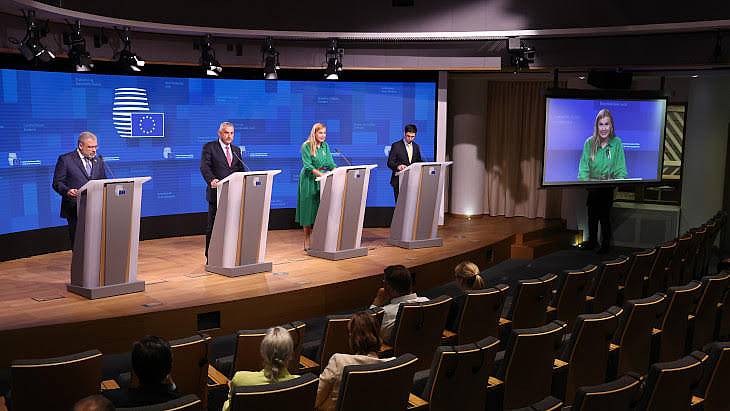Ukraine offers to support EU as continent braces for gas crisis
27 July 2022
Nuclear power imported from Ukraine could avoid consumption of 5-6 billion cubic metres of gas in the EU this winter - more than one-tenth of the total reduction that EU countries agreed when an extraordinary session of EU energy ministers on the energy crisis was joined by their Ukrainian counterpart, Herman Halushchenko.
 Herman Halushchenko (left) alongside Jozef Síkela, Kadri Simson and the moderator of a press conference held on 26 July in Brussels (Image: European Union)
Herman Halushchenko (left) alongside Jozef Síkela, Kadri Simson and the moderator of a press conference held on 26 July in Brussels (Image: European Union)
The meeting of energy ministers was convened to discuss and agree terms for a joint effort to cut gas consumption in the EU by 15% from August until March 2023, the period during which there is concern that gas supply will be even tighter as the conflict between Russia and Ukraine continues.
The 15% is a voluntary target for each country based on its average consumption in the last five years. It is to be achieved through fuel switching, avoiding using gas in the electricity sector, public information campaigns and targets to reduce heating and cooling demand. The effort is expected to save up to 45 million cubic metres of gas.
However, in case of severe shortage, there is provision in the agreement for a 'Union Alert' to be issued, subject to a proposal by the European Commission executive and approval by qualified majority of the European Council, which is made up of member state governments. This could see mandatory cuts to consumption, rationing, and the shutdown of certain energy intensive industries. It is hoped that these extreme measures would preserve supply for essential services like hospitals and the heating of homes, without which lives would be at risk.
Joining the EU energy ministers was their Ukrainian counterpart, Herman Halushchenko, who spent three days in Brussels, holding a roundtable with them and a press conference, in addition to a number of bilateral meetings.
Halushchenko celebrated the support that Ukraine's energy sector has received from the European neighbours, noting the accelerated connection of the country's grid to the ENTSO-E network, which covers the bulk of mainland Europe. "Full use of our electricity export potential - more than 1.5 GWe," Halushchenko said, "will allow European countries to replace 5-6 billion cubic metres of Russian gas." This would be as much as 13% of the total reduction.
In June, Halushchenko said that Ukraine's potential to export electricity comes from the country's nuclear power plants, which usually supply more than half the of Ukraine's electricity but have been underutilised due to the impact the conflict has had on domestic electricity demand. At that time, he said that Ukraine was prepared to export 1.69 GWe, and with further technical improvements the volume could be as high as 5 GWe.
Ukraine's energy ministry said: "Synchronisation of the Ukrainian energy system with ENTSO-E as well as the opening of exports from Ukraine to the EU is a significant and rather valuable decision."
Halushchenko's bilateral meetings included the chairman of ENTSO-E, Joachim Vanzetta, as well as the European Commissioner for Energy, Kadrie Simson, the Czech Republic's Minister of Industry and Trade, Josef Sikelo, and France's Minister for Ecological Transition, Agnès Pannier-Runacher.
Ukraine's summary of the meeting with Pannier-Runacher noted the major role nuclear energy plays in both the French and Ukrainian grids and that France has expressed political support for Ukrainian electricity exports. "Nuclear power generation is one of the main factors of Europe's transition through the autumn-winter period," Halushchenko said to Pannier-Runacher.
Zaporizhzhia
Halushchenko called on European colleagues to oppose the Russian military presence at the Zaporizhzhia nuclear power plant - they have controlled the site and scrutinised its operation by its Ukrainian staff for nearly five months.
On 22 July, the head of the International Atomic Energy Agency, Rafael Mariano Grossi, said that he continues his "determined efforts" to lead a safety, security and safeguards mission to Zaporizhzhia "as soon as possible". Ukraine opposes a mission while the Russian military remain in control of the site - Halushchenko told EU energy ministers that to do so would "legitimise Russia's presence" - and the country says that the best safety measure would be for the Russian military to leave the area of the nuclear power plant.
Researched and written by World Nuclear News